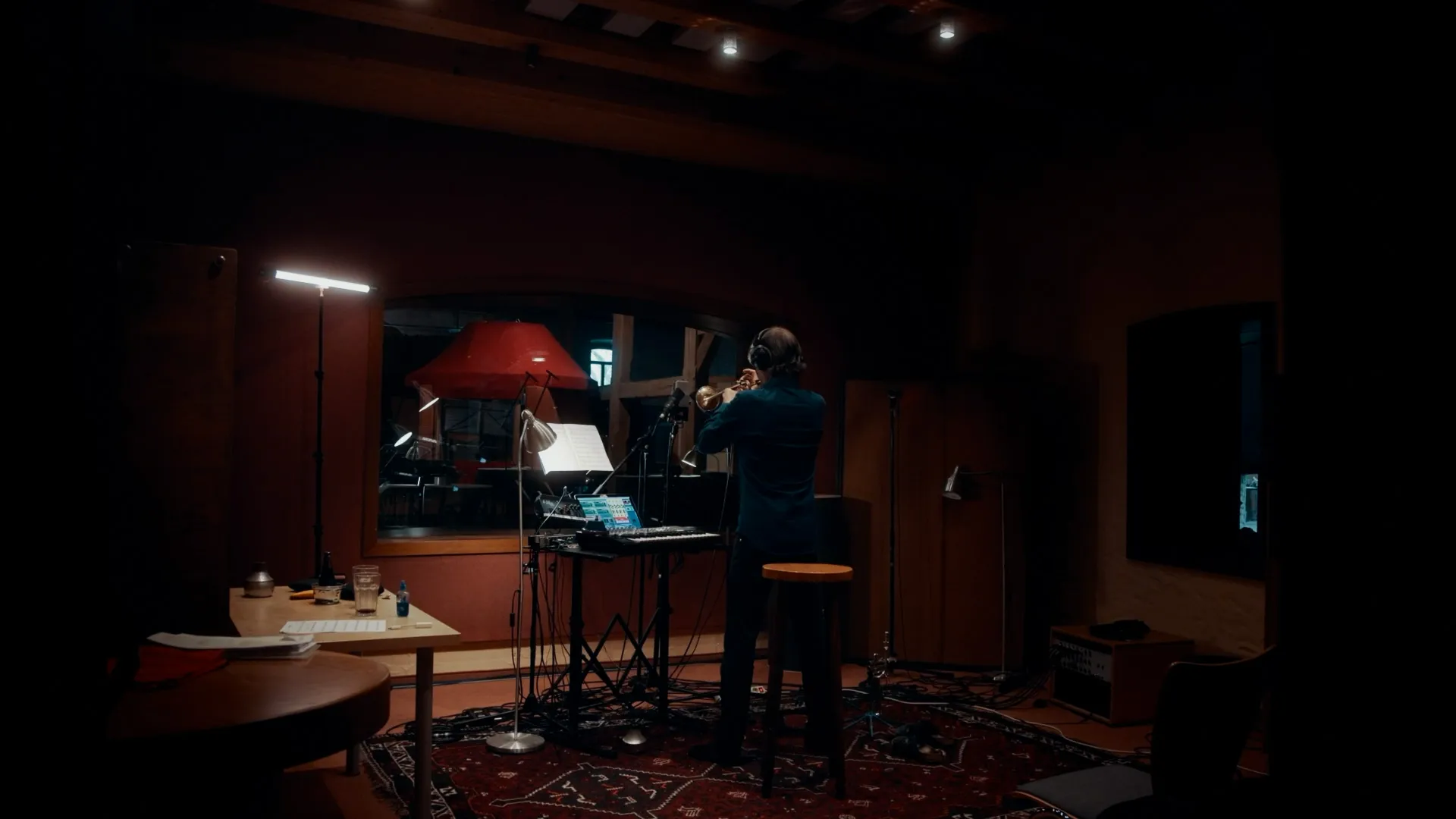Markus Stockhausen About „Slow“
Studio Sessions: Trailer New CD
„Celebration“ April 2024
„Intuition“ means „grasping something instantly, all of a sudden, without rational thought“, says Stockhausen. We suddenly understand connections without knowing why. New paths and solutions emerge spontaneously, for example when faced with problems.
Musician Markus Stockhausen says: „With intuitive music, I am initially in a neutral position when I go on stage. I don’t have anything specific in mind, but open myself up to the intuition of the moment. In this way, an initial sound develops into a sound structure that is directly related to that moment.“
If you transfer this to everyday life, it is the indefinite situations in which you have nothing to do or consciously indulge in doing nothing. Then you can get involved in the moment, doing what arises out of nothing. To do this, you have to open up and be wide awake in order to grasp the next step and not overlook or miss it.
This also applies to intuitive interaction with other people. Not expecting anything from them, not wanting to predetermine anything, but instead taking a step back, noticing others, responding to them with consideration and empathy. Experience togetherness from the moment and allow familiarity to develop.
Surrendering to intuition means freeing yourself from all predetermination. To consciously seek out emptiness, to patiently endure it. Being able to wait until something appears or happens. Not putting yourself under pressure. But also to have the courage, when the moment has come, to enter something and take action. The moments in which we succeed in doing this give us a gift: „Intuition is always fresh and new and appropriate to the situation.“ This is also a sound for non-musicians.

ABOUT INTUITIVE MUSIC
Sabine Loh in conversation with Markus Stockhausen
1. when you make music intuitively, what happens mentally and cognitively? Do you think in tones? Do you intuitively hear the notes that you will and want to play „beforehand“?
MS: This is probably different for all musicians, depending on their instrumental mastery, listening experience and awareness. I actually always know which notes I want to or will play, I usually hear them inwardly shortly beforehand, as with the trumpet you always have to technically adjust your body to the notes, the pitch. But there are also phases where the cognitive „knowledge“ of what I’m doing becomes insignificant and the music just flows. Ideally, everything is there together: a creative „flow“ of ideas that are realised immediately but consciously.
2 Nadia Boulanger once said: „Does something remain in the sieve or is it all just flowing water? Water that just keeps flowing is lost water.“ – So what is left behind when you play intuitively?
MS: The bird that flies, did it fly in vain? No, it is an expression of life. It’s the same with all notes, sounds and music, they resound and fade away. Mature and successful compositions have a longer life than fleeting improvisations, but even that has changed nowadays, because improvisations can also be recorded and therefore have a long life and can be listened to again decades later.
3. you want to free yourself from all constraints with intuitive music. You want to achieve the greatest degree of freedom. Nadia Boulanger said: „You have to have respect for yourself, to take it seriously (without arrogance) that you exist. If you don’t take existing seriously, you can’t play well, you can’t think well, you can’t live well.“ What does it mean for you to take yourself seriously?
MS: Freeing yourself from all constraints? It’s not easy, because everything we hear and play has a life of its own, it resonates, it’s there somewhere. But that’s a good thing, it forms the basis of free play.
To take yourself seriously or not to take yourself seriously – neither applies to me. Being true to yourself, yes, in a natural way. I try to express what stirs in me, what shows itself, in sounds and compositions. Of course, this has a history of self-discovery and the realisation that what is one’s own is valuable and can exist alongside everything else. My father was a great role model for me: how naturally he realised the craziest ideas in his music and didn’t give up until they became reality according to his vision.
I would wish that for all people: a natural, healthy self-awareness, without vanity or pride, without shyness or fear.
4 Paul Valéry is said to have once said: „If you want to write down your dream, you have to wake up.“
MS: A good sentence!
5 How is it with composing? Do you first create a piece intuitively, i.e. in and with your musical imagination, and then switch to a rational, technical mental state in order to write the piece down?
MS: This is probably also different for everyone who composes. Some approach it very rationally, others simply let ideas flow without any reflection. There are composition techniques that can be learnt (I never studied them), which guarantee a certain quality of composition (good craftsmanship), but which are no guarantee for good and soulful music that is able to touch others.
For me, everything flows together, my modest knowledge, the intuitive, inner listening of the music, the elaboration, further development of ideas, the contemplation of what I have achieved. With the composition programme in the computer, you have the wonderful opportunity to listen to what you have composed and to be your own teacher, and to work on the composition until it corresponds to your inner vision and your own ideal of beauty.
6 In Wuppertal you said that intuitive music-making wakes you up. You have to be wide awake in order to play freely. How does that go together – intuition and alertness?
MS: Yes, your mind has to be fully awake, otherwise you’ll doze off and won’t be able to perceive everything, especially when playing with others, to which you should ideally relate very consciously. It’s really challenging to be aware of everything the others are playing and at the same time to invent your own tones and sounds that fit in perfectly with the music, or that take a leading role at the right time and indicate a new direction.
7 For Nadia Boulanger, people such as Mozart or Bach had their very own order of thinking, which draws them into their own sphere of emotion, their own sensual and technical activity. How are thinking, emotion, sensual and technical activity connected for you?
MS: Every person is their own universe. They carry their own cosmic creation formula within them, so to speak. Bach and Mozart were extraordinary musicians who were able to shape our culture over long periods of time. Highly developed souls, so to speak, who came with a special task to guide us all. Like many others.
But every human being carries this cosmic potential within them, like a seed. But only very few recognise their potential and do everything they can to develop it further. The environment you are born into often plays a decisive role in the development of your talents. Fortunately, many gifted people have been extremely encouraged by their parents or certain teachers who recognised their talent. Other talents remain dormant, but are still there and can blossom later. The decisive factor is what we want: Development can take place when an inner will awakens to seize the opportunity and bring one’s own talents to fruition with a great deal of diligence.
Some great musicians seem to have been „born with everything“. However, they have probably already trained themselves sufficiently in the past so that they can „hit the ground running“.
Others may be very gifted mediums and their task is to be a channel for other great spirits who bring new music into this world through them. There are no limits to the divine imagination, all forms of existence are conceivable – and appear.
8 Despite all the technical training required to master an instrument and to compose, Nadia Boulanger’s ability to make music is structurally of the greatest simplicity. Beyond all training and study, she refers to musical intuition, which must be preserved and held on to at all costs. This raises the question of how to maintain and cultivate your intuition beyond all technical endeavours. How important is musical intuition to you and how do you nurture it?
MS: Intuition is inherent in everyone. The simple sensing, listening to the inner sense: this, now THAT, or THIS … or THIS NOT. This listening, hearing, perceiving the inner sense, an often delicate feeling – this can and must be cultivated, e.g. through meditation. In absolute silence, freed from external influences – at least for a while – inner impulses appear that give direction.
As we get to know this feeling better and better, it can become a habit to incorporate this feeling alongside rational thinking and weighing up, or even to make the intuitive our inner compass.
Then you may behave differently to what your surroundings expect, play different music, live differently, you begin to behave freely, unbound by conventions or social (or musical) rules, but knowing them and applying them as you wish.
This includes repeatedly keeping yourself as free as possible from all external influences, as in the practice of silence or in chosen „time-outs“. But it can also be achieved through pure concentration on something specific, a composition, an improvisation: complete concentration on something excludes everything else – including your own thoughts about other things – and creates the necessary freedom. It is a skill that you acquire over time, for example through countless experiences with intuitive playing. My father was also an impressive role model for me in this respect: he had a tremendous ability to concentrate.
9 For Nadia Boulanger, conventions are points of reference that give development a certain form, and if you have lived in the intellectual order for a long time, you enter the intuitive order again. But if there is no intellectual order in the intuitive and nothing intuitive in intellectuality, then something is missing. How do you see the interplay between rational intellectual order and intuition?
MS: Both complement each other and, depending on maturity, they are highly developed. Ideally, they are in balance, heart and head united in a harmonious way.
Sabine Loh’s questions refer to the book:
„Ich denke in Tönen – Gespräche mit Nadia Boulanger„
Von Bruno Monsaingeon · Berenberg Verlag · 2023

